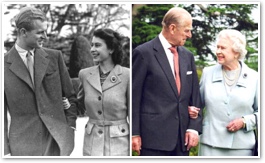An honest discussion about divorce is rare
- FATHER RAYMOND J. DE SOUZA
I doubt there was any deliberate connection, but the Royal wedding was in fact another cultural marker in the normalization of divorce.
 Her Majesty's Government for Canada announced, the day after the Queen's official birthday (Victoria Day), and a few days after the Royal wedding, its reform of the Divorce Act. I doubt there was any deliberate connection, but the Royal wedding was in fact another cultural marker in the normalization of divorce. The Queen herself remembers another age, when in 1936 her uncle Edward VIII abdicated so that he could marry an American divorcee. The Archbishop of Canterbury at the time, Cosmo Lang, made it known that in such an eventuality not only would he refuse to crown Mrs. Simpson queen, he would refuse to crown Edward king.
Her Majesty's Government for Canada announced, the day after the Queen's official birthday (Victoria Day), and a few days after the Royal wedding, its reform of the Divorce Act. I doubt there was any deliberate connection, but the Royal wedding was in fact another cultural marker in the normalization of divorce. The Queen herself remembers another age, when in 1936 her uncle Edward VIII abdicated so that he could marry an American divorcee. The Archbishop of Canterbury at the time, Cosmo Lang, made it known that in such an eventuality not only would he refuse to crown Mrs. Simpson queen, he would refuse to crown Edward king.
Sixty years on, when the Prince of Wales was divorcing the Princess, the Archbishop of Canterbury, George Carey, made it clear that he would crown Charles king, married, divorced, cohabiting, remarried, whatever. Twenty-two years later, and Archbishop Justin Welby is personally marrying Charles' son to an American divorcee.
If Archbishop Welby had looked around the "quire" where the most important guests were seated — Oprah Winfrey, George Clooney and Her Majesty — he would have seen an assembly in which staying married is the exception and divorce the norm, beginning with three of the Queen's four children.
In the line of sight of the Archbishop during the exchange of wedding vows was the Prince of Wales who, now we know, never intended to keep his wedding vows. Camilla was a "nonnegotiable" part of his life, he confessed later, without contrition. Indeed, there she was at his side in the quire, no doubt marvelling that the new Duchess of Sussex got to marry her prince in the chapel. When Camilla, a divorcee herself, married her prince in 2005, she and Charles resorted to a shabby affair at the civic registry in Windsor, before doing the walk of shame back to the castle where the Queen awaited.
All of which is to observe that divorce is such a normal part of life that the grand custodians of civic virtue consider it wholly unremarkable. And because it is so normal, it can be discussed more honestly.
Back when Charles and Diana were separated, but not yet divorced, The Good Divorce by Constance Ahrons was published. It was typical of so much "surprising research" at the time that presented divorce as a such a boon to the flourishing of spouses and children that it was a wonder why anyone stayed married. It was an essentially defensive exercise of course, against common sense and the common experience that divorce is wrenching for all concerned, inflicting enduring scars. But it belonged to a generation of ideological literature that presented divorce as a good thing in itself.
No one thinks that anymore. So it was noteworthy to hear the impeccably progressive Canadian minister of justice, Jody Wilson-Raybould, say that her new legislation "will help support and protect families, especially children, from the negative outcomes and conflicts that are the sad reality of separation and divorce."
The preacher, who spoke about many things but not at all about marriage, did not remark upon that. It would have seemed somehow out of place.
That's a "reality" that official public policy and social science, in the face of plenty of evidence, both scholarly and anecdotal, determinedly ignored for a long time. Remember that the next time you hear that public policy must be "evidence-based."
The new reforms attempt to find alternatives to family courts for divorce proceedings, and do away the terms "custody" and "access," if not the realities they describe. They propose "parenting time" as a replacement, which sounds suspiciously like the "quality time" concept that was fashionable back in the 1990s.
The key change is that best interests of the child are to be put first, which is a formal acknowledgment that the divorcing parents often do not do so. It's an important shift away from the idea — embedded for several generations now in thinking about marriage and divorce — that gave priority to the freedom and desires of the parents, and assumed that accommodating mom and dad would also be good for the children.
The legislation aims to remove the backlog from clogged family courts. All to the good, but a sober reminder that the breakdown of family life means that tens of thousands of government employees are engaged in ruling upon and supervising the relationships between parents and children. The idea that a state bureaucrat would determine when a mother can pick up her child from school is rightly regarded as frightening, except when it becomes so normal as to be unnoticed anymore.
The Queen and the Duke of Edinburgh observed their 70th wedding anniversary last November — longer than all of their children's marriages combined. The preacher, who spoke about many things but not at all about marriage, did not remark upon that. It would have seemed somehow out of place.
 This is Meaghen Gonzalez, Editor of CERC. I hope you appreciated this piece. We curate these articles especially for believers like you.
This is Meaghen Gonzalez, Editor of CERC. I hope you appreciated this piece. We curate these articles especially for believers like you.
Please show your appreciation by making a $3 donation. CERC is entirely reader supported.

Acknowledgement
 Father Raymond J. de Souza, "An honest discussion about divorce is rare." National Post (May 25, 2018).
Father Raymond J. de Souza, "An honest discussion about divorce is rare." National Post (May 25, 2018).
Reprinted by permission of the National Post.
The Author
Father Raymond J. de Souza is the founding editor of Convivium magazine.
Copyright © 2018 National Post



